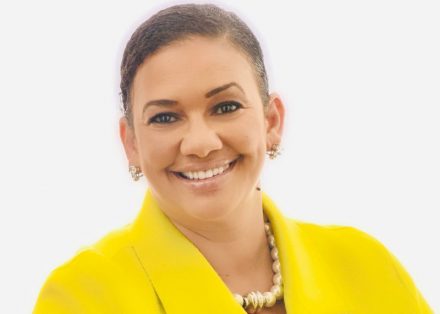The Jan. 19 event was a discussion with Hayes-Greene, co-founder of The Racial Equity Institute, by Vice President and Associate Provost Randy Williams and Assistant Professor Stephanie Baker.
Racism in this country is not a simple problem and can’t be solved by simple solutions, said Deena Hayes-Greene, co-founder of The Racial Equity Institute, during Elon’s Martin Luther King Jr. Commemorative Lecture on Tuesday, Jan. 19. Even reaching an agreement on how race and racism are defined in this country presents a challenge, she said.

Drawing from her experience as a community organizer and her work with the Greensboro, N.C.-based institute, Hayes-Greene said while some view racism as a collection of hateful actions, others understand it as a more systemic malady affecting society at many levels and within many organizations. For antiracism work to be successful, that shared understanding of what it is must exist, she said during the event, which was a discussion with Vice President and Associate Provost for Inclusive Excellence Randy Williams and Assistant Professor of Public Health Studies Stephanie Baker streamed online.
“Organizing is that collective capacity-building of people, of a base of people that is working with a shared understanding of what the problem is,” Hayes-Greene said. “How we diagnose a problem determines how we treat it.”
The lecture is part of a series of events hosted by Elon this month to commemorate the legacy of the Dr. Martin Luther King Jr. Tuesday night’s discussion touched on three themes for this year’s commemoration — developing a world perspective, the time to be antiracist is now, and eliminating poverty.
Hayes-Greene, who also chairs the Guilford County Board of Education, shared that her roots in community organizing and activism stretch back to becoming an “accidental organizer” after attending an “Undoing Racism” workshop by The People’s Institute for Survival and Beyond at the invitation of Nettie Coad, the late Greensboro activist who was instrumental in pushing for a revitalization of the Ole Asheboro Street Neighborhood in southeast Greensboro. Hayes-Greene explained that at the time she was a member of the city’s Human Relations Commission and did not think such a workshop was necessary for her, as a minority already working in the area of human relations and civil rights.
“I said, ‘I’m Black — I know this,'” Hayes-Greene shared. “It was such a foolish thing to say. After 20 years in this field, I feel I know less today than I did when I felt I knew so much.”
Among the lessons she took away from that early workshop was that “an organized lie is more powerful than a disorganized truth.” It’s a lesson she’s tapped into as she’s worked for a deeper examination into this country’s history of racism and oppression, noting during Tuesday’s discussion that Black people in the United States have been plagued by slavery or the injustice of the Jim Crow era for nearly 90 percent of the past 400 years. As the nation was being built, often on the backs of enslaved laborers, those in power were establishing norms and standards. What should have been “a way” of doing things instead became “the way,” she said.
Given that history of institutionalized racism, the end of slavery or the Jim Crow era were not enough in and of themselves to resolve the issue of race in America, Hayes-Greene said. “You can’t have that kind of history, unchain them, and then say you’re free to compete and everyone has an equal opportunity,” she said. “Reconciling is a process. It’s not an act. It’s not an event.”
That reconciliation means delving deeply into the history of this country and the long-term ramifications of racism, Hayes-Greene said. “At the end of the process, you have to make people whole again,” she said. “You have to restore people and put them back into their original condition prior to their injury. … We have to go back and understand what happened in order to be able to get out of it.”
The distance that exists between people in modern times and those living during the times of slavery and Jim Crow does not mean White people today don’t have a responsibility to act, Hayes-Green said. “You don’t get off because you didn’t do it,” she said. “You are tied to things to things that were done in your name. Racism robs White people of humanity because of the things that have been done in their name.”
Today, organizers and activists are building upon the strides that those of previous generations have been able to achieve. Hayes-Greene noted that for many years, that activism was done from outside organizations and institutions to urge them to act, and now there is a focus on what leaders within institutions can to to advance anti-racism. She now sees police chiefs, corporate leaders, educational leaders and others in positions of power within their own organizations reaching out to The Racial Equity Institute. She views the institute’s mission as taking the brilliant work of many people, and putting it together in ways that resonate with people.
“This is the fruit of their labor,” she said. “I am just glad that we get to carry the ball from here.”


